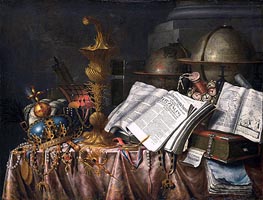
Edwaert Collier Painting Reproductions 1 of 1
1642-1708
Edwaert Collier occupies a fascinating niche in the annals of Dutch Golden Age painting, his works a delicate balance of illusion and introspection. Born as Evert Calier on January 26, 1642, in Breda, North Brabant, he embarked on an artistic journey that would see him traverse both geography and genre. Trained in the vibrant city of Haarlem, his early paintings reveal the guiding hand of Vincent Laurensz van der Vinne, suggesting a mentorship that shaped his formative years. By 1664, Collier had secured his place in the artistic community by registering with the Haarlem Guild of St. Luke.
Seeking new horizons, Collier moved to Leiden by 1667 and became a member of the Leiden Guild of St. Luke in 1673. This period marked a maturation of his style, as he delved deeper into the complexities of vanitas and trompe-l'œil painting. His relocation to Amsterdam by 1686 signaled another chapter, but it was his move to London in 1693 that truly expanded his influence. The English capital, with its thriving art market and appetite for novelty, embraced his intricate illusions with enthusiasm.
Collier's oeuvre is characterized by meticulous arrangements that challenge the viewer's perception. He masterfully painted letters, newspapers, prints, and everyday objects to appear as if they protrude from the canvas, a testament to his skill in trompe-l'œil. These compositions are more than visual tricks; they are contemplations on the transient nature of life, echoing the themes of memento mori. His inclusion of popular prints and ephemera of the day adds a layer of social commentary, anchoring his work firmly in the context of his time.
After a sojourn back in Leiden between 1702 and 1706, Collier returned to London, where he spent his final years. He was laid to rest on September 8, 1708, at St. James's in Piccadilly. Today, his paintings grace the halls of institutions like the Rijksmuseum, the Tate, and the National Portrait Gallery, continuing to captivate with their deceptive simplicity. Dror Wahrman's book "Mr. Collier's Letter Racks" delves into the nuances of his trompe-l'œil works, offering insight into an artist who deftly blurred the lines between reality and representation.
Seeking new horizons, Collier moved to Leiden by 1667 and became a member of the Leiden Guild of St. Luke in 1673. This period marked a maturation of his style, as he delved deeper into the complexities of vanitas and trompe-l'œil painting. His relocation to Amsterdam by 1686 signaled another chapter, but it was his move to London in 1693 that truly expanded his influence. The English capital, with its thriving art market and appetite for novelty, embraced his intricate illusions with enthusiasm.
Collier's oeuvre is characterized by meticulous arrangements that challenge the viewer's perception. He masterfully painted letters, newspapers, prints, and everyday objects to appear as if they protrude from the canvas, a testament to his skill in trompe-l'œil. These compositions are more than visual tricks; they are contemplations on the transient nature of life, echoing the themes of memento mori. His inclusion of popular prints and ephemera of the day adds a layer of social commentary, anchoring his work firmly in the context of his time.
After a sojourn back in Leiden between 1702 and 1706, Collier returned to London, where he spent his final years. He was laid to rest on September 8, 1708, at St. James's in Piccadilly. Today, his paintings grace the halls of institutions like the Rijksmuseum, the Tate, and the National Portrait Gallery, continuing to captivate with their deceptive simplicity. Dror Wahrman's book "Mr. Collier's Letter Racks" delves into the nuances of his trompe-l'œil works, offering insight into an artist who deftly blurred the lines between reality and representation.
1 Edwaert Collier Paintings

Vanitas Still Life 1662
Oil Painting
$4997
$4997
Canvas Print
$64.93
$64.93
SKU: COE-13451
Edwaert Collier
Original Size: 102.5 x 132 cm
Rijksmuseum, Amsterdam, Netherlands
Edwaert Collier
Original Size: 102.5 x 132 cm
Rijksmuseum, Amsterdam, Netherlands